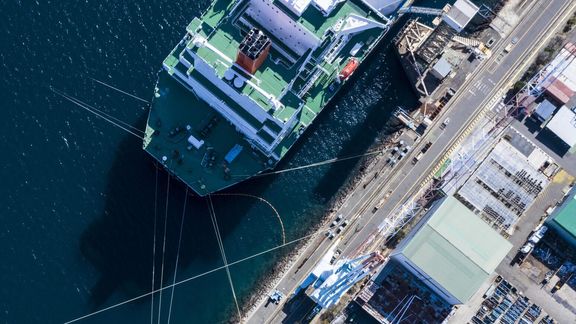Government action needed to decarbonize shipping by 2050
Source: Global Maritime Forum
Signatories of the Call to Action for Shipping Decarbonization urge world leaders to align shipping with the Paris Agreement temperature goal. The private sector is already taking important steps to decarbonize global supply chains.

Now governments must deliver the policies that will supercharge the transition and make zero emission shipping the default choice by 2030.
Full decarbonization of international shipping is urgent and achievable. This is the clear message from more than 150 industry leaders and organizations representing the entire maritime value chain, including shipping, cargo, energy, finance, ports, and infrastructure. In conjunction with the UN General Assembly and ahead of critical climate negotiations at COP26 in Glasgow this November, they call on governments to work together with industry to deliver the policies and investments needed to reach critical tipping points in decarbonizing global supply chains and the global economy.
Signatories to the Call to Action for Shipping Decarbonization include some of the world’s largest actors in global trade: Anglo American, A.P. Moller - Maersk, BHP, BP, BW LPG, Cargill Ocean Transportation, Carnival Corporation, Citi, Daewoo Shipbuilding & Marine Engineering, ENGIE, Euronav, GasLog, Hapag-Lloyd, Lloyd’s Register, Mitsui O.S.K. Lines, MSC Mediterranean Shipping Company, Olympic Shipping and Management, Panama Canal Authority, Port of Rotterdam, Rio Tinto, Shell, Trafigura, Ultranav, Volvo, and Yara.
Ships transport around 80% of global trade and account for about 3% of global greenhouse gas (GHG) emissions. In 2018, the UN’s International Maritime Organization (IMO) adopted an initial GHG strategy. It aims to reduce international shipping’s total annual GHG emissions by at least 50% of 2008 levels by 2050. The strategy is set to be revised in 2023.
Signatories of the Call to Action for Shipping Decarbonization call on world leaders to:
- Commit to decarbonizing international shipping by 2050 and deliver a clear and equitable implementation plan to achieve this when adopting the IMO GHG Strategy in 2023.
- Support industrial scale zero emission shipping projects through national action, for instance by setting clear decarbonization targets for domestic shipping and by providing incentives and support to first movers and broader deployment of zero emissions fuels and vessels.
- Deliver policy measures that will make zero emission shipping the default choice by 2030, including meaningful market-based measures, taking effect by 2025 that can support the commercial deployment of zero emission vessels and fuels in international shipping.
The Call to Action for Shipping Decarbonization has been developed by a multi-stakeholder taskforce convened by the Getting to Zero Coalition – a partnership between the Global Maritime Forum, the World Economic Forum, and Friends of Ocean Action. Members of the taskforce include Cargill Ocean Transportation, Citi, the COP26 Climate Champions team, the Energy Transitions Commission, Lloyd’s Register, Port of Antwerp, Torvald Klaveness, Trafigura, Yara, and UMAS.